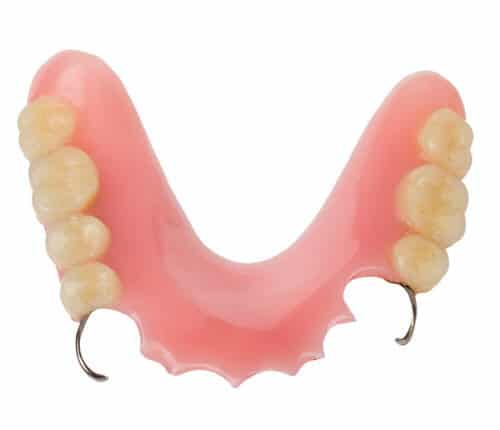
Basically removable partial dentures come in two types. An acrylic or metal base. Both have their advantages and disadvantages. The type suited to your particular requirements can be assessed in consultation with your dental prosthedontist.
A partial denture offers improved appearance and function. It helps maintain the remaining natural teeth, improves and restores appearance, speech and certainly the ability to chew.
Partial Denture Assessment
Assessment of a patient requiring a partial denture may vary according to the age of the patient, the patient’s attitude, habits and expectations. Oral hygiene, the condition and position of the remaining teeth, as well as the position of the opposing teeth in the mouth, also need to be considered.
A recent check up of your remaining natural teeth by a dentist is advised prior to the construction of a new partial denture.
Tissues covered by a denture normally do not maintain the same bone density level and tends to gradually shrink or recede.
It is therefore imperative that your partial denture be reassessed or replaced at regular two yearly intervals.
Natural teeth are continually wearing down due to masticatory forces. These are the forces that are applied when you eat.
Conservation of the remaining natural teeth is enhanced and wear and tear is minimised by distributing these forces of chewing and grinding evenly to all teeth, including any artificial teeth. A partial denture plays a large part in minimising the wearing down of natural teeth.
A partial denture situated around the natural teeth and opposing a full denture usually results in the full denture being more successful and stable. This is due to the better balance and distribution of all the opposing forces involved in chewing, swallowing and speaking.
To become accustomed to your partial denture more quickly, it may help to cut food into smaller portions and to master chewing on the premolar (first double teeth) and molar regions (back teeth) first and then on both sides of the mouth at the same time. Consuming non sticky food also helps.
Retention of your Partial Dentures
Retention of a partial denture is normally obtained by attachment to a natural tooth or teeth on each side and by stainless steel or metal clasps.
Friction against the remaining natural teeth and adhesion from saliva are all aids used to gain retention and stability.
Metal clasps are precise fitting and will not wear or affect your natural teeth. Clasps do however collect plaque which damages the enamel on the teeth. Proper oral hygiene is therefore paramount.
Night Time
Dentures invariable occupy more space in the mouth than natural teeth. Wearing the appliance continuously enables the tongue and tissues to more quickly gain tolerance of the new denture. Wearing your denture at night may be dictated by personal preference however it is recommended that dentures are removed at night.
Cleaning
Proper oral hygiene is just as critical for artificial teeth as it is for natural teeth. It is especially important that the gums around and between the teeth are kept thoroughly clean to prevent build up of plaque or tartar and to prevent odours.
Whenever possible clean and brush your denture after each meal to remove debris, with particular attention to the tissue fitting surfaces of the denture and areas around the clasps where food will tend to gather.
Ideally, regular soaking in a commercial denture cleaner and the use of a soft denture brush with denture paste, prevents the build up of tartar deposits that tend to collect and build up around the teeth, gums and clasps.
It is advisable to never use harsh bristle brushes or abrasive materials. use tepid water only, as boiling water may distort the denture.
To prevent accidental damage by dropping the denture, chipping the teeth or fracturing the denture base, it is advisable to hold the side or the part of the denture you are actually cleaning over a sink containing a towel or face washer. All care must be taken to avoid disturbing, breaking or bending metal clasps or retainers, as the fit needs to be precise. If a break occurs, immediately consult your dental prosthedontist.
It is advisable that you consult with a dentist or a dental hygienist for an annual check up, scale and clean.
Repairs and Additions
If a partial denture requires repairing, never attempt to repair it yourself or use household adhesives. Always contact your dental prosthedontist as the type of denture repair required may vary greatly. The stress of chewing puts enormous pressure on teeth and denture base. If natural teeth are subsequently lost or extracted, it is normally possible to add additional artificial teeth to your partial denture, as a temporary measure.
Metal Dentures
Metal or cobalt chrome alloy dentures have superior physical properties and generally occupy less space in the mouth than acrylic dentures. They are stronger, have a greater resistance to fatigue and are less likely to break under normal conditions.
Acrylic Dentures
Acrylic or plastic base dentures are a quicker solution for temporary dentures. they can be used for almost all cases, but are not necessarily the best for the majority of cases. They are a lightweight and easier material to repair, but are weaker and can fracture more easily due to the forces of chewing, therefore they generally require a thicker and more extensive coverage, making the denture more bulky be design.
Contact Prestige Denture Clinic in Ballarat today on (03) 5332 7301 if you have any questions or require further information regarding partial dentures or to book an appointment.

